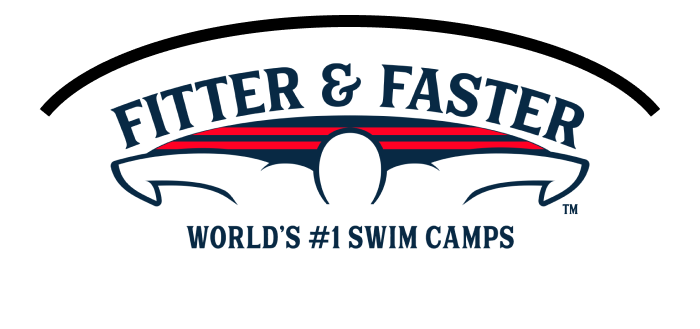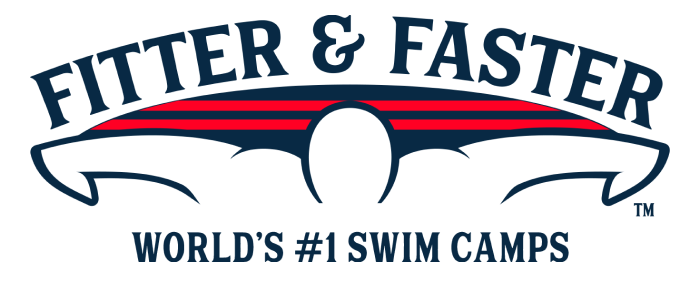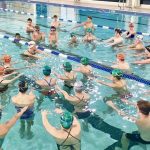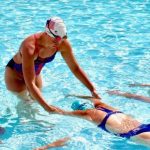Past Clinic: All Four Strokes Technique Swim Camp for Ages 7 to 10
Houston Swim Club - Sharpstown
8307 Augustine Dr,
Houston,
TX 77036
A description of what was covered at this past clinic is below the upcoming clinics.
Upcoming Swim Clinics and Camps
Within 250 miles of Houston, TX.
Past Clinic
Introduction
Fitter & Faster is returning to the Houston Swim Club - Sharpstown in Houston, Texas to produce a 2-day swim camp for competitive swimmers ages 7 to 10 years-old on October 19 & 20, 2024. See below for additional swim camps in Houston! This camp will be led by Elite Clinician and Olympic Gold Medalist, Clark Smith!
ALL FOUR STROKES SWIM CAMP - Houston, TX (Ages 7 to 10)
DAY 1 (Saturday, Oct 19)
-> Session 1: Freestyle Technique
-> Session 2: Backstroke Technique
DAY 2 (Sunday, Oct 20)
-> Session 3: Breaststroke Technique
-> Session 4: Butterfly Technique
Scroll down for details on the curriculum!
-> Availability in each session is limited to ensure the best learning experience.
-> SAVE when you purchase the “Entire Camp Bundle” for your swimmer.
SESSION START TIMES:
Saturday, Oct 19:
-> Session 1: Check in 12:30 PM. Camp 12:45 - 3:15 PM
-> Session 2: Check in 3:45 PM. Camp 4-6:30 PM
Sunday, Oct 20:
-> Session 3: Check in 8:15 AM. Camp 8:30-11 AM
-> Session 4: Check in 11:45 AM. Camp 12-2:30 PM
ADDITIONAL SWIM CAMPS IN HOUSTON:
Suggested Participants
Our top priority is to provide a world-class learning experience for all participants at all of our camps. This camp has sessions for swimmers ages 7 to 10. If you are the parent of a child under the age of 7 and would like for your child to be considered for the younger sessions of this camp, please complete this questionnaire. If you're looking for more camps in Houston, see below:
Curriculum
Over 2 days, our elite clinicians will work with your swimmer on proper, efficient technique for all four strokes!
Oct 19, Session 1: FREESTYLE TECHNIQUE
Cultivating good habits to swim high level freestyle begins as soon as you learn the stroke. Even if your swimmer is already in high school - it’s never too late to begin practicing techniques that will drastically improve their efficiency, power and times. Today, your swimmer will work on techniques to strengthen their bodyline, catch, kick, pull, and breathing pattern.
- BODYLINE: A freestyle race is going to be fastest with the proper bodyline. Even the slightest adjustment of the chin, neck, and/or back can make a huge difference. As swimmers mature in the sport and grow physically, their body position shifts and often bad habits are created. Participants will learn and practice proper posture and engagement of their core to have a strong foundation for better technique - creating a full-body connection for more hydrodynamic and efficient strokes.
- ROTATION: Freestyle is fastest and most efficient when a swimmer’s body is “rotating” around their spine with each stroke. This part of swimming freestyle has a big effect on maintaining a proper bodyline. Participants will practice activating their core muscles to form a powerful connection from head to toe with every stroke.
- KICKING: A swimmer’s kick is the motor behind their freestyle! There are obviously proper and improper ways to kick which we will review at the camp. Just as important, however, is practicing the complexities of how and when swimmers need to “shift gears” in their legs to become stronger and faster racers.
- PULL: The pull in freestyle keeps a swimmer balanced and accelerating forward. This is a skill that needs cultivation throughout all swimmers’ careers. Having an early vertical forearm “catch” enables a swimmer to put immediate pressure back on the water. Properly completing the stroke keeps the swimmer moving forward efficiently. The later the “catch” or not “finishing” the stroke has a negative impact on a swimmer’s bodyline and speed.
Oct 19, Session 2: BACKSTROKE TECHNIQUE
Starting early in developing backstroke skills is crucial for swimmers. During session 2, your swimmer will focus on strengthening their bodyline, improving their catch, kick, and pull, all of which will lead to faster backstroke races.
- BODY LINE: A competitive swimmer’s bodyline is the key to fast swimming. The name of the game is to eliminate all extra movement of the body including even the slightest bobbing, wiggling. Participants will learn and practice proper posture and engagement of their core to have a strong foundation for better technique - creating a full-body connection for more hydrodynamic and efficient backstroke.
- ROTATION: Backstroke is fastest and most efficient when a swimmer’s body is “rotating” around their spine with each stroke. This part of swimming Backstroke has a big effect on maintaining a proper bodyline. Participants will practice activating their core muscles to form a powerful connection from head to toe with every stroke - resulting in faster backstroke!
- KICK: A swimmer’s kick is the motor behind their Backstroke! There are obviously proper and improper ways to kick which we will review at the camp. Just as important, however, is practicing the complexities of how and when swimmers need to “shift gears” in their legs to become stronger and faster racers.
- PULL: Just like in freestyle, the pull in backstroke keeps a swimmer balanced and accelerating forward. Essentially the best swimmers are creating a paddle with every stroke. The clinicians will work with participants to establish an early vertical forearm “the catch”, enabling the swimmer to put immediate pressure back on the water. Properly completing the stroke keeps the swimmer moving forward efficiently and fast.
Oct 20, Session 3: BREASTSTROKE TECHNIQUE
Out of the eight finalists at the Olympic Games, you might see eight different styles of breaststroke! A swimmer's timing and ability to eliminate resistance are hallmarks of an efficient and powerful breaststroker. No matter your swimmer’s level, this session will strengthen their technique and lead to faster and more efficient breaststroke races… and faster IM’s!
- BODYLINE: A breaststroke race is going to be fastest with a proper bodyline. Even the slightest adjustment of the chin, neck, and/or back can make a huge difference. Elite breaststrokers focus on minimizing drag by “catching water” on their hands and feet as quickly as possible, so they can shoot back into a “straight bodyline” where they can glide at top speed.
- KICK: The kick creates a lot of the power in breaststroke. Swimmers need to keep their knees high in the water and snap their feet quickly around and back to create a powerful kick. Our clinicians will work with participants to strengthen their kick for the ultimate propulsion forward!
- PULL: The name of the game in breaststroke is to create as much propulsion as possible in the pull while minimizing resistance… and then quickly getting back into a straight bodyline to establish a high speed glide. Participants at this session will focus on setting up a proper "catch" and keeping their hands and elbows high on the water throughout the entire pull. The techniques your swimmer will practice will minimize resistance and enable them to maintain forward momentum for the fastest breaststroke.
- TIMING: Fast, flowing breaststroke is the result of proper timing between a swimmer’s hands and feet. Establishing proper timing in your swimmer’s breaststroke will allow for more fluidity, power and speed. Participants in this session will learn how elite swimmers time their breaststroke for ultimate efficiency and the fastest races.
Oct 20, Session 4: BUTTERFLY TECHNIQUE
At the highest level of swimming, butterfly is the second fastest stroke and beautiful to watch because of its rhythmic and powerful strokes. There are some complexities to establishing a smooth, rhythmic fly, but with practice and attention to detail your swimmer can master the stroke and begin swimming it for longer distances and at very fast speeds!
- BODYLINE: A butterfly race is going to be fastest with a proper bodyline. Even the slightest adjustment of the chin, neck, and/or back can make a huge difference. As swimmers mature in the sport and grow physically, their body position shifts and bad habits can emerge. Participants will learn and practice proper posture and engagement of their core to have a strong foundation for better technique - creating a full-body connection for more hydrodynamic and efficient butterfly strokes.
- KICK: Each butterfly stroke has two kicks to propel the swimmer towards the other end of the pool! If the kicks are properly timed and equally strong, they can positively impact your swimmer’s efficiency and stroke timing! Your swimmer will work on how and when to kick in butterfly for maximum speed.
- PULL: Long and smooth strokes allow swimmers to have a more efficient and fluid butterfly. The pull in butterfly keeps a swimmer accelerating forward. Your clinicians will work with participants to establish an early vertical forearm, “the catch”, enabling the swimmers to put immediate pressure back on the water. Properly completing the stroke keeps the swimmer moving forward efficiently and fast.
- BREATH: The timing of the breath in butterfly has a direct relationship on a swimmer’s body position, pull, kick and TIMES! At this camp, we will work with participants on breathing with their chin low to the water... and WHEN to breathe in their stroke cycle so that they develop the most efficient stroke possible!
ASK QUESTIONS
Swimmers and parents are invited to ask the clinicians questions during a Q&A session. Gain insight into their training regimen, diet and nutrition, and recovery tactics.
WATCH THE CLINICIANS
Observe clinicians swim at full speed and demonstrate a progression of perfectly executed drills to achieve powerful, efficient and fast swimming.
PUT YOUR SKILLS TO THE TEST
Throughout the camp, swimmers will practice what they've learned with some of the world's most elite Swimmer Clinicians and coaches!
Take a photo, get autographs, and chat with your clinicians!
Inquisitive, Educated Swimmers are Faster Swimmers! Sign up today!
Search all of our clinics...or request a clinic in your area


